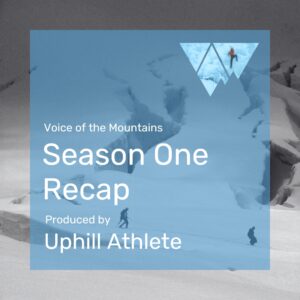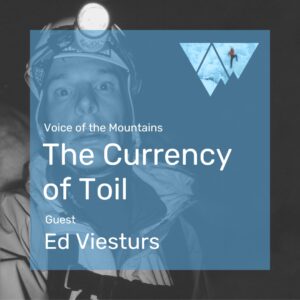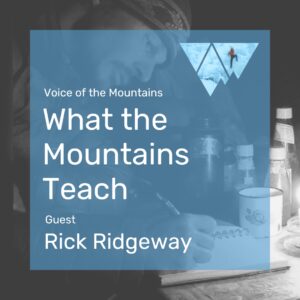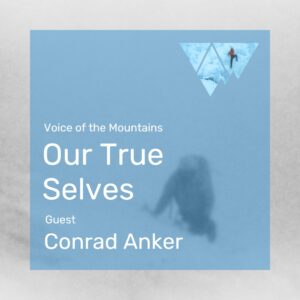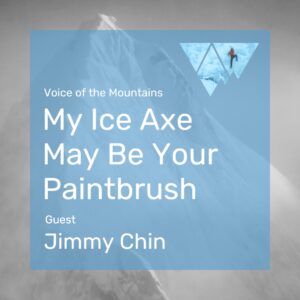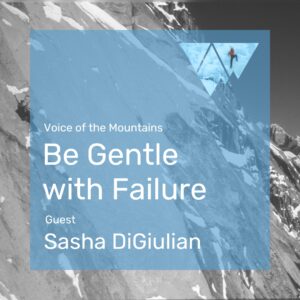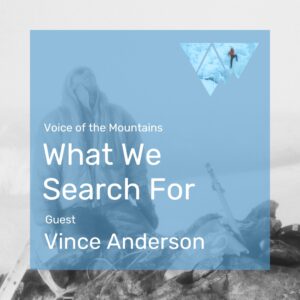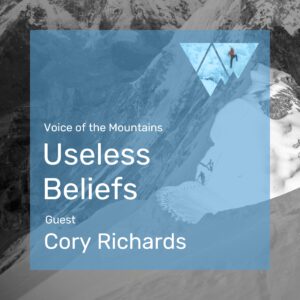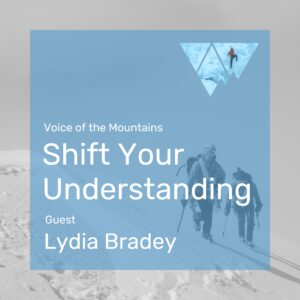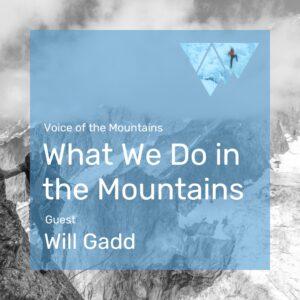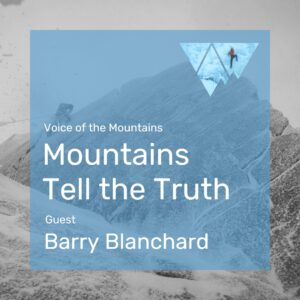My Ice Axe May Be Your Paintbrush
Guest Jimmy Chin
Most of us will never reach the pinnacle of our most passionate pursuit, no matter how driven we are. Through dedication, creativity and ingenuity, our guest today has reached the pinnacle of three of his passions.
Beginning with a unique journey to discover climbing and skiing, then the discovery of an interest in photography, which finally led to becoming a premiere feature and documentary filmmaker, Jimmy Chin has forged his path with resilience, empathy, and a desire to tell important stories.
Jimmy’s accolades and accomplishments speak volumes about a climber and artist who has pushed boundaries and silenced doubters. But it has always been the manner with which Jimmy has achieved that is most impressive. Steve and Jimmy discuss the evolution of his career and the catalyst for picking up a camera in the pursuit of climbing. They dive into the moral qualms Jimmy had shooting Free Solo and how and why he decided to create the award-winning documentary.
Tune in for a conversation between two legends of the sport.
Images by Cheyne Lempe and Chris Figenshau, courtesy of Jimmy Chin.
LISTEN ON:
LIKE, COMMENT, AND SHARE:
READ THE COMPANION ESSAY
Exploring the poetic soul of the mountains.
Voice of the Mountains explores the mental and emotional adventures found in discovering who we are and what we’re capable of. Here we engage in self-reflection, humility, and embrace the beauty and struggle of the alpine experience equally.
ALL EPISODES
00:00:04:06 – 00:00:35:11
Steve
The best documentary filmmaker of his generation began not by wanting to tell a story. His aim was simply to be able to dive into more dumpsters and climb more big walls and to be the best climber he could become. For Jimmy Chin, taking pictures started as a means to a rather inglorious end, and he will tell you of his beginning selling a single photograph for $500 and how that image was the means to perpetuate his life as a dumpster diving stone monkey in Yosemite Valley.
00:00:35:13 – 00:01:06:04
Steve
My ice axe may be another man’s paintbrush, and mountain sports are indeed sports. And the Starry night is a painting. Yet climbing is a sport and yes, Van Gogh left us with a painting. But what we do in the mountains on the daily and over a lifetime is an expression of creation. The paintbrush, the ice ax and the film camera are creative tools.
00:01:06:05 – 00:01:37:14
Steve
And they are more. They are a means to an end. But what means and to what end? One of the puzzles of life is how one goes from a dumpster diving climber to winning an Oscar. How did you go from where you came from to where you walk today, and how much of it is the choices you made and how much of it is a mysterious, sometimes cruel, sometimes benevolent gift from the universe?
00:01:37:16 – 00:02:04:07
Steve
When Jimmy tells us that composition always made sense to him, he’d hold the camera to his eye and see the frame. How does that apply to your life? To mine? How do you see your frame and how can that put you on the not so proverbial red carpet of your life? That is a puzzle. We’re trained on puzzle because we all know there’s far more to seeing a frame than holding a viewfinder to your eye.
00:02:04:09 – 00:02:29:20
Steve
You have to be able to see images woven into a tapestry that will capture an audience and transport them deep into the minds of the subjects of your creation. To do that, you have to know what is real. But how do you know what is real? How does Jimmy Chin know what is real? Climbing, skiing, running. These are all a continual exercise in failure and futility.
00:02:29:22 – 00:02:49:05
Steve
They are a steaming, hot heaping portion of humble pie served up every time you lace up your boots and go big. Think about it. We purposefully pick things we cannot do, and then we go try our hardest to do them. And we almost always fail anyways. And we go home, get more information, train more impact light or whatever.
00:02:49:10 – 00:03:15:05
Steve
Until one day you can do it. Because at some point along the way you became the person that could do it. Mountain Sports Teach us that. Mountain sports teach us to dream big, to set goals, to just go for it and to fail. As Jimmy tells it, he has a lot of bad photographs, starting trying, doing whether in the editing room or in the mountainside.
00:03:15:07 – 00:03:42:07
Steve
The creative act of doing is what unleashes a flood of experience that can teach us to understand what is real and what is not. Creating is so difficult and yet creating is what allows us to understand life in a way that nothing else can. There is a lot more to swinging an ice ax than aligning your thumb vertically along the broad side of the shaft and mountains, whether under a pair of hoka running shoes or La Sportiva mountain boots.
00:03:42:09 – 00:04:14:13
Steve
Teach us what is real and what is not, what is bad out and what is easy. What is cake and what is frosting? It has been part of our mission with Voice of the Mountains to celebrate the diverse bounty that mountains bring into our lives. Grit, toughness and determination are the seeds that sprout merit, self-determination and success. And the means can serve the purpose, the means certainly determine the priority, and the priority determines where we spend.
00:04:14:13 – 00:04:37:02
Steve
The energy and energy we have in this life is certainly, in my opinion, our most valuable asset. I think we can all agree that if Jimmy hadn’t needed that 500 bucks to live another month in Yosemite Valley, we would all be poorer for it. He just wanted to be a better climber. That weighs on Jimmy constantly. How to be a better climber.
00:04:37:06 – 00:05:10:15
Steve
Even now, 25 years later, he thinks about that and how to stay authentic and how to peel back layers of meaning and story and resources and boil them all down to extract the essence of human experience in the film into creation and into one more good day of climbing. From Uphill Athlete. I am founder and CEO Steve House, and this is Voice of the Mountains, where we explore the philosophy and humanity of mountain sports.
00:05:10:17 – 00:05:40:07
Steve
This is where we ask ourselves who we are, what we learn, and who we want to become as a result of these adventures. This is Voice of the Mountains. Most of us will never reach the pinnacle of our most passionate pursuit, no matter how driven we are. Our guest today through dedication, creativity, ingenuity, has reached the pinnacle of three of his passions, beginning with a unique journey to discover, climbing and skiing, and then the discovery of an interest in photography.
00:05:40:08 – 00:06:09:13
Steve
Through that and finally becoming a premier feature and documentary filmmaker Jimmy Chin has forged his path with resilience, empathy and a desire to tell important stories. As a climber, Jimmy has led expeditions to the Karakorum and Pakistan and has done numerous first descents around the world as a skier. Jimmy, along with others, became the first and I think only person to ski down the South Pole route on the face of Everest.
00:06:09:15 – 00:06:44:10
Steve
Jimmy is award winning photography has appeared in National Geographic, Vanity Fair and outside, among many other publications. His first book of photography from back was a 2021 New York Times best seller alongside his wife and co-director Elizabeth Chai Avasarala. Jimmy won an Academy Award for their documentaries Free Solo, which, as most of us here now chronicled Alex Donald’s harrowing pursuit to become the first person to free solo, aka the critically acclaimed film had the highest grossing opening weekend for a documentary film in history.
00:06:44:12 – 00:07:12:03
Steve
Jimmy’s accolades and accomplishments speak volumes about a climber and artist who has pushed boundaries and silence doubters. But it has always been the manner with which Jimmy has achieved this that has impressed me most. His charismatic but humble, ambitious, but knows that a path without shortcuts is the most rewarding one. He has become an icon but never forgets all of the people who aided and influenced his journey.
00:07:12:05 – 00:07:22:13
Steve
I can say without any hyperbole that he is one of the adventure sports true originals. I’m honored that he has taken the time to join Voice of the Mountains. Welcome, Jimmy.
00:07:22:15 – 00:07:30:02
Jimmy
Oh, man. In making me blush. But yes, thank you for that very kind introduction.
00:07:30:04 – 00:07:42:10
Steve
Yeah, it’s heartfelt. Do you remember the first time we met? Probably around 2000, 2001 or so. I was trying to remember when it was.
00:07:42:12 – 00:07:53:11
Jimmy
I forgot until this very moment. Oh, God. I used to know the name of the hotel is a little side hotel in Skardu.
00:07:53:13 – 00:08:01:24
Steve
Yeah. God, I can’t remember now either. What is that place? I stayed there every time. It was like the Indus Hotel.
00:08:02:01 – 00:08:13:02
Jimmy
The in this hotel? Yes, it was in this hotel. And I was there with Brady Robinson. I forgot. That’s where we met.
00:08:13:06 – 00:08:25:00
Steve
And pretty fitting, right? Like, that’s where you want to be. Climbers is someplace like that. And you guys were heading. Did you guys go to the Taku? So that year? Do you remember what year it was or did.
00:08:25:02 – 00:08:33:04
Jimmy
We were heading into the Cherokee. Yeah. And I believe you guys were going for G4.
00:08:33:06 – 00:08:35:17
Steve
We went to G4 in 1999.
00:08:35:19 – 00:08:36:23
Jimmy
It was 1999.
00:08:36:24 – 00:08:38:15
Steve
Was it 1999? Yeah. Yeah.
00:08:38:19 – 00:08:40:08
Jimmy
You were with.
00:08:40:10 – 00:08:44:14
Steve
Yeah. Steve Swenson, Andy. Dick Clark and Charlie Mays.
00:08:44:16 – 00:08:59:12
Jimmy
Yeah. And I remember thinking, Oh, there’s the big boy team. We’re like the little grubs, and we’re going to go out and try to climb some little tentacle, and these guys are going to climb something really big and very well.
00:08:59:16 – 00:09:21:03
Steve
You probably climb something. We didn’t get too far. But one of the things I remember that trip, we were dedicated. We spent 89 days at base camp. We had the whole season up there. Oh, and were so emaciated and destroyed at the end of that. That’s still my personal record. For the longest time, without a bath.
00:09:21:05 – 00:09:22:12
Jimmy
Incredible.
00:09:22:12 – 00:09:39:24
Steve
And I don’t need to ever beat that record, by the way. I’d never do. There was another time we met. I think it was a couple of years later, and I think it was at the Patagonia Service Center warehouse up in Truckee. Remember that?
00:09:40:01 – 00:09:41:05
Jimmy
And I knew.
00:09:41:07 – 00:10:06:21
Steve
You know, in preparation for this, I went back and rewatched Meru and Free solo and listened to some of your podcasts with other hosts and stuff, and particularly with Mario. It really reminded me that, you know, I distinctly remember this feeling like that you, you, you sort of opened the door to some collaboration. And if I have one regret, it’s that I never took you up on that.
00:10:06:21 – 00:10:33:13
Steve
And I take responsible for that because I really felt at the time that it wasn’t possible like that albinism was sort of like, you know, the like quantum physics. Like if you observed it, it would change it. And particularly with Meru, like, you know, you showed that that doesn’t that, of course, can be like that. But you showed a path to doing that.
00:10:33:13 – 00:11:11:17
Steve
And now that I’m, you know, in my early fifties, I look back at all those stories that we sort of, you know, lived and missed and, you know, didn’t get the tell that are hard to tell without a powerful storyteller. Like what who you are. So I just wanted to kind of put a pin in that because I think that it comes back to a lot of the topics I want to talk about today and are theme for today is I was a little quiet and I said that I wrote We are not to be blamed for thinking our undertakings are beautiful and grand for they are my Isaac’s maybe your paintbrush.
00:11:11:19 – 00:11:42:01
Steve
And you started out as first a skier and then a climber and sort of learning the art of the ice ax, if you will. And then along the way, you picked up the paintbrush of a camera. And this is a path that other climbers have taken, picking up various paint brushes, cameras, pens, lecterns, different things, you know. Do you have a story of how that came to be that sort of dawned on you that the mountains were a canvas for you beyond climbing and skiing?
00:11:42:03 – 00:12:17:15
Jimmy
You know, it started out as something very practical. And there’s this story that I’ve told before, and you’ve probably heard Grady Robinson, who my climbing partner and mentor in a lot of ways had picked up a camera and wanted to be a photographer. And he showed me how to use his camera. And I took one photo with it and I went at the end of the month when he had taken all those photos, he he submitted it to a bunch of places to see if you could sell some of his photos.
00:12:17:15 – 00:12:53:03
Jimmy
And he only sold one photo. And it happened to be my photo. And he was so pissed. So Brady sold the photo for $500. And, you know, I’m a total dirtbag climber and I was literally like, dumpster diving. I remember with, like, Brady and some of the other monkeys in the Valley. And I remember thinking as a 20 year old would think, Man, I only have to take one photo a month and I can live like this forever.
00:12:53:05 – 00:12:53:22
Steve
Yeah.
00:12:53:24 – 00:13:21:09
Jimmy
And there was no idea of being a visual storyteller or any of these things. I was just naive and I thought, well, how hard could it be to become a professional photographer? Like, This is great. You can make money just taking photos of like your friends and it certainly evolved from there. Yeah, but that was the beginning. It was very practical dirt bag, you know, rationale.
00:13:21:12 – 00:13:27:21
Steve
Was it the photographer or was it the subject and the rich subject matter that was all around you every day?
00:13:27:23 – 00:13:57:10
Jimmy
It was the idea that I mean, this just goes to show I mean, in a lot of ways that that it still holds true to a certain degree. Like, what do I need to do to be able to keep climbing? Yeah, and that part’s still true. I still you know, it’s like all of this is a means to being able to spend the time with the people who I respect and admire that inspire me.
00:13:57:12 – 00:14:24:03
Jimmy
And to be able to go to the mountains or to go climbing and have those experiences that really, I feel enrich my life, that give my life meaning and purpose. Like, I still wake up in the morning and if I get to go climbing that day, I still wake up in the morning and I’m still as excited as I was when I was 19 or 20.
00:14:24:09 – 00:15:11:01
Jimmy
And that feeling has inspired all the rest of it, you know what I have gotten out of climbing and the relationships I’ve gotten out of climbing in the experiences and the feelings and understanding what’s real and not real and understanding, you know, life in a way that nothing else has ever shown me or taught me. So in a way, that 20 year old rationale for how am I going to keep climbing, I’m happy that it’s still true for me, and it has provided all of the rest of the inspiration.
00:15:11:01 – 00:15:46:12
Jimmy
So, you know, I was hanging out at that time. It was like Dean Potter and Timmy O’Neill and Conrad and Kevin Thor. And I think the human brothers were around and Senate Ogden And, you know, I can list those they pariah and then make me a little holding had shown up like it was just such a cast of characters that were constantly blowing my mind.
00:15:46:12 – 00:16:09:08
Jimmy
You know, in what they were doing. I also realized I was like, You know what? I don’t think I’m ever going to like those guys. They’re on another level and if I want to keep hanging, I got to figure out something useful to do. So again, it was very pragmatic and photography really did come to me quite easily.
00:16:09:10 – 00:16:37:19
Jimmy
And I attribute it to I think that we always had these amazing Chinese paintings in my house. Landscape paintings and composition always made sense to me. Like I brought you know, viewfinder up. I’d look through the camera and I would see the frame. And that that came to me. And I, I had a sense that this was something that, that I could do.
00:16:37:19 – 00:17:03:17
Jimmy
And so I started shooting. And, you know, this is about the time when a lot of these guys are gaining some notoriety. And there were sponsors that needed photos and magazines that needed photos of these guys. And they were my friends. And so I could move in the mountains and I could I could move around and I’ll cap I had my systems dialed.
00:17:03:17 – 00:17:41:04
Jimmy
I was pretty efficient and they knew I wasn’t a liability so they could trust me to go out there and shoot with them. And that kind of became my role. And I was the guy that they would call and someone needed photos. I had bought a camera with that $500 and I started shooting a lot. But something did happen, which was that a lot of my friends were really inspiring to me, and I did feel compelled to tell their stories because I was like, This is incredible.
00:17:41:04 – 00:18:11:17
Jimmy
And no one even knows that they’re doing this up there, do they? People even have an idea of how hard it is to do what they’re doing and how good they are? And I did feel really compelled to tell their stories and to show share what they were doing. And and that is something that’s always stuck with me in terms of like what I look for when I’m shooting something because it comes from a very authentic place.
00:18:11:19 – 00:18:12:07
Steve
Mm hmm.
00:18:12:09 – 00:18:42:11
Jimmy
And in a lot of ways, like, you know, as a climber, as, you know, you can’t not do it. And I got to that place with photography where I could not do it because I was seeing images everywhere all the time. And I was going on these adventures and the light would turn a certain way and we would be in these just outrageous, wild places, you know, That’s when the mountains became a canvas for me.
00:18:42:13 – 00:19:05:12
Jimmy
Mm hmm. And the people that I was with and really inspired me to shoot. And that’s the kind of the beginning of the evolution. And I really fell in love with photography. I fell in love with coming back with these little treasures, you know? Mm hmm. And then I started to set my sights on, you know, like a climber does.
00:19:05:12 – 00:19:23:09
Jimmy
You’re like, Okay, I want to climb El cap or I want to climb that mountain. I was like, Okay, well, I want to be a National Geographic photographer. What’s what’s it going to take to be able to do that? And eventually ending up shooting for the geographic and having just like in the climbing world where you have mentors?
00:19:23:11 – 00:20:00:02
Jimmy
I had mentors as photographers, as mentors, and I started to really understand, you know, visual storytelling and how do you create a tapestry for people to understand and a real narrative within within these images? And just like anything, you know, you become really focused on the craft. Mm hmm. But all of those, you know, becoming a photographer and eventually becoming a filmmaker, the basis of how I approached them all came from climbing.
00:20:00:04 – 00:20:32:22
Jimmy
You know, I always think about climbing as this exercise in failure, where you you pick things that you don’t know that you’re able to do or that you don’t even think you can do. But you throw yourself at it and you take all the necessary steps and you fail and you come back and try to be better, stronger and it your systems more dialog, get more information and you try and try again until you succeed.
00:20:32:22 – 00:21:05:09
Jimmy
And that that mentality really is kind of the basis of how I approached photography. Mm hmm. And it really allowed me to dream big because a lot of those early expeditions seemed so outrageous and unlikely. And I pulled off a couple of climbs, you know, and I was like, okay, this is this is how you do it. I don’t know any other way.
00:21:05:11 – 00:21:28:06
Jimmy
How to do it. So, like, I never studied photography and I certainly never studied filmmaking, but I went into it being like, okay, you got to set some goals, you got to go for it, and you will certainly fail many, many times along the way. I mean, I have a lot of bad photographs and.
00:21:28:08 – 00:21:29:10
Steve
You know.
00:21:29:12 – 00:21:57:09
Steve
There’s a quote, parallel. You know, I’ve heard like from other sports, you know, I’ve looked at other sports. It’s like, you know, Roger Federer said like, well, you know, tennis is an exercise in failure because you lose approximately 50% of all the serves. It’s like. Now, that sounds pretty good to me, like losing only 50%. Like, if I could have only lost 50% of the time that I went climbing, that would have been I would have been the most successful climber in history by a long shot.
00:21:57:11 – 00:22:26:01
Steve
People’s climbers have grit. You know, this is one of the themes that I’ve noticed with mountain athletes. And this is exactly the reason I want to have these kinds of conversations is because I think there’s so much richness in the mountain sports. And I’m going to I’m going to throw skiing and mountain climbing and rock climbing and climbing and and trail running all into that that, you know, there’s it just takes a tremendous amount of grit.
00:22:26:06 – 00:22:34:06
Steve
And part of it is because there is no, like, material reward really. You know, it’s very rarely like do people make it as a professional climber.
00:22:34:08 – 00:22:35:08
Jimmy
Yeah.
00:22:35:10 – 00:22:52:00
Steve
Yeah, yeah, exactly. You said something to me one time. You were like, I just want to become the best climber I can be. And I was like, Oh, wait, that’s my mission statement. Like, how did you feel? My, you know, And then, like you said, it was practical. Like, Oh, I need to fund another month in the valley, so I need to sell one picture.
00:22:52:00 – 00:23:00:20
Steve
Right? Like, it’s a, that’s like the immediate step in the goal of just trying to become a better climber. Like I need $500 to lift that kind of thing.
00:23:00:21 – 00:23:08:04
Jimmy
Yeah, absolutely. And I’m still trying to be the best player. I every day.
00:23:08:06 – 00:23:08:15
Steve
Yeah.
00:23:08:19 – 00:23:13:07
Jimmy
I’m shredded to great because they ask you the.
00:23:13:13 – 00:23:14:09
Steve
Words you go.
00:23:14:09 – 00:23:21:07
Jimmy
I’m getting I just went to this little crag in Idaho in Teton.
00:23:21:09 – 00:23:22:02
Steve
To jump in.
00:23:22:07 – 00:23:51:16
Jimmy
Mm hmm. Yeah. Great little granite crag. And I haven’t been really doing a ton of granite climbing. I haven’t been doing a ton of. I actually. I climbed the Hulk twice in the last few weeks, which was great as well. But, yeah, still, like, you know, my best days and the last couple months of getting to go out on the Hulk and at that place is amazing.
00:23:51:18 – 00:24:29:22
Jimmy
But yeah, I would say that climbing is still very much a part of my life. And in fact, as I get older, I recognize how important it is and why it’s so important to me. You know, like I said, it’s it taught me so much and it’s taught me also, I think, something really important, which is something that you touched on earlier, was this idea of, you know, when you when you talk about climbing is being like quantum physics.
00:24:29:22 – 00:25:11:02
Jimmy
If you look at it, something changes. And and that idea of purity is something that I came up with, not that I came up with that it was something that I was pounded into me, you know, and I’m not just saying this because you’re you have me on a podcast, but authenticity was so important to me. And working with, like Dean, he was just like really intense on authenticity as well.
00:25:11:02 – 00:25:54:24
Jimmy
But like Conrad, that community is about authenticity, right? Because you’re you’re taught what’s real and what’s not real. You’re taught what’s like, actually badass and what’s quite a bit softer. But like for for a non climber, it’s hard to discern between like what’s real and what’s not real in the climbing world. And the style and which things. And, you know, that weighs on me constantly in everything that I do because of people like you, you know, and that idea of style and like.
00:25:54:24 – 00:25:58:03
Jimmy
Yvonne Chouinard Right. So classic.
00:25:58:08 – 00:26:01:18
Steve
Yeah. My biggest here, you know, today. Yeah.
00:26:01:20 – 00:26:22:01
Jimmy
And my biggest hero to me is I literally went and made a movie about because I was like that community, that group of people. That is the real deal. And you know, you’ve got all these people in the world, big egos, finance CEOs, whatever, and you’re like, Yeah, well, you want to know what’s real? Check this guy out.
00:26:22:06 – 00:26:23:02
Steve
Yeah.
00:26:23:04 – 00:26:23:15
Jimmy
This is.
00:26:23:15 – 00:26:24:13
Steve
Real. Totally.
00:26:24:14 – 00:26:26:14
Jimmy
Doug Tompkins That’s real.
00:26:26:16 – 00:26:31:01
Steve
Christine Tompkins has to be on that list to record.
00:26:31:02 – 00:27:01:24
Jimmy
You want real quick Checkup refers to her and Chris Tompkins and ancient art. And what I wanted to say is that like the amount of focus I put on authenticity in the storytelling is the North Star for me when I’m making a film. And when I made Meru and when I made Free solo, I would think, What would Steve Howe think?
00:27:02:01 – 00:27:26:07
Jimmy
What would Yvonne Chouinard think? You guys were like The filter in which I was like, You know, what about that? Steve now has too much dude, that, that that’s they’re going to look at that fucking B.S. you know, it was like you. Yvonne Krakauer I’m like, Who’s going to call me on that shot? And I would literally be like, Sit there.
00:27:26:07 – 00:27:31:14
Jimmy
And I think now that’s got to go. It’s too much. Like.
00:27:31:16 – 00:27:35:21
Steve
In what way? Give me an example. Paint a picture for the listeners.
00:27:35:23 – 00:28:10:10
Jimmy
Well, because, you know, if you’re making a film, it’s the same as in climbing as an architecture and many other genres of professions or work where simple is actually the hardest. Yeah. And people who are editors or studio heads, they always want to overdramatize. No, no, no. You got to keep that in there. It’s dramatic, but it’s And writing the same thing, right?
00:28:10:16 – 00:28:27:03
Jimmy
It’s like, Oh, you can write in, embellish and use all kinds of, you know, flair to to try to write something that’s really simple. And if anybody who knows what’s going on is going to be like, that’s a bunch of just yeah, I can’t even because it.
00:28:27:03 – 00:28:30:04
Steve
Doesn’t pass the sniff test, the authenticity test, it.
00:28:30:04 – 00:29:05:24
Jimmy
Doesn’t pass the test and so, you know, like, I can’t think of anything specific right now, but it’s it’s like, okay, just tell it as it is and keep it simple and clear and and people will get it because it’s going to be authentic. You don’t need to blow it out of the water and try to pound something into people because you’re, well, usually afraid that you’re not good enough as a filmmaker to get the point across.
00:29:05:24 – 00:29:37:23
Jimmy
And you have to trust in yourself and the story to be able to do that. And I just had a conversation with a very amazing architect named Tom Kendig, and he was saying the same thing. He’s like in architecture, it’s the same for me. My philosophy is like the cleanest, the simplest. And same with Yvonne, you know, design philosophy, the simplest, the cleanest, but it’s the hardest to achieve, actually, you know, and.
00:29:37:23 – 00:29:43:01
Steve
Less because you’re distilling, you’re not embellishing, you’re pulling it down to the essence.
00:29:43:03 – 00:30:09:02
Jimmy
And that is how we make films. And that was a sensibility that I love and appreciate and respect about. My wife. Chai is she is brutal in the attic room. It’s just you. You don’t need it. And we will literally trim and trim and trim. And if it works without it, we didn’t need it. And we call it killing your babies, right?
00:30:09:02 – 00:30:17:19
Jimmy
Yeah. Like it’s a thing. It’s shot that I spent two weeks trying to get, and she’s like, Yeah, it’s a nice shirt, but we don’t need it.
00:30:17:22 – 00:30:19:16
Steve
Doesn’t move the story forward.
00:30:19:18 – 00:30:42:21
Jimmy
Nope. And it hits the editing room floor and I, you know, it’s a little painful, but I get it because it’s all for the you know, to serve this idea of, like, authenticity and simplicity. And, you know, again, whether it’s design or writing or filmmaking, it’s the hardest to achieve.
00:30:42:24 – 00:31:00:13
Steve
I first heard this phrase Killing the Babies from Allison Osias, who was an editor at Rock and Ice magazine at the time, about 30 years ago. And I had some paragraphs in there and she’s like, Nope, you got to kill the babies. And I was like, Well, what do you know? You’re like, I was like, kind of recoiled.
00:31:00:15 – 00:31:33:03
Steve
So I use that phrase, too, in my in my writing, not my, you know, not my filmmaking. But yeah, it’s it’s it’s such a thing. It is so it is amazing how much emotional attachment you get to those those things that you feel so attached to. One of the themes that has come up repeatedly in this series is this idea, the difference between the things you should not be doing and the things you cannot do, the canon representing like the the impossible, the shit that’s are often much more powerful.
00:31:33:03 – 00:31:52:12
Steve
There is sort of a could be I don’t know if it’s your parents speaking or sometimes it’s the patriarchy speaking, sometimes it can be all these things and the cannot always have this romantic beckoning like, Well, they say it’s impossible, but maybe I’m the one, right? Like I could if I just apply myself. But they should not implies a social price.
00:31:52:14 – 00:32:20:02
Steve
And you’ve, I think, faced some should nots in your own development as a climber. And the stories I’ve heard about how you stuck to your, you know, climbing spirit, you know, despite it not being well understood by your by your folks. And that’s interesting. But this is where I think like the free solo movie was so good because it and I just need to say this to you because I never told you like, I couldn’t watch it for the longest time because I was like, Meryl Lee.
00:32:20:04 – 00:32:37:11
Steve
Not sure if it was okay. Like, even though I knew the outcome, I was just like, I don’t know, you know? And then I heard you in an interview where you discussed that conversation you had with with Krakauer about like, whether or not you should do it because you had the same reservations about whether or not you should even be filming him.
00:32:37:11 – 00:32:53:04
Steve
And I was like, Oh, okay, yeah, I get it. They thought that through and that that stands up. And then I went and watched it. But I think one of the reasons and it’s amazing and one of the reasons I think it’s so amazing is because it combines something that’s impossible for sure. Nobody can do that. And also it’s like and nobody.
00:32:53:04 – 00:32:56:17
Steve
Should do it. But that’s just like.
00:32:56:19 – 00:33:14:19
Steve
Why, you know, nobody understands why Alex or frankly, anyone would anyone would ever want to do that and then make a film about the nexus of all of that. And that’s such a powerful story. I want to hear your insights on our thoughts about should not.
00:33:14:21 – 00:33:39:22
Jimmy
We should definitely talk about it because this is a conversation I would love to have with you. I had an incredibly conflicted period when the film was financed, and the way it came about was that we made Meru. It was, you know, a pretty successful theatrical release and a bunch of studios are like, What are you going to make next?
00:33:39:24 – 00:34:05:19
Jimmy
And I was talking to a producer. I had all these different ideas and we were about to hang up and he said, Any other ideas? And I just was like, Well, and one other idea, and I didn’t even want to say it out loud, and I just assumed it wouldn’t blow over. And I said, I have this friend, Alex Honnold is he’s an incredible three soloist.
00:34:05:19 – 00:34:12:21
Jimmy
And right then and there he was like, That’s the movie. And I was like, Oh shit, I shouldn’t even have said it.
00:34:12:23 – 00:34:14:09
Steve
Yeah.
00:34:14:11 – 00:34:40:13
Jimmy
The thing is, is that I had worked with so many incredible athletes by that time, and I had started spending some time with Alex and, you know, Kevin and Mark’s and Connor and I took him on his first international expedition and I got to see what he was capable of. And also who he was as a human being.
00:34:40:15 – 00:35:12:04
Jimmy
And I had just never seen or experienced anything like it. And I knew he was special and different in all of these different ways. It’s like he’s an intersection of like all these unique attributes that, you know, make it possible for him to freestyle cap. So I was conflicted from the beginning and I was like, whatever, we’ll we’ll pitch, pitch this stuff and hopefully no one will ever pick it up.
00:35:12:06 – 00:35:41:00
Jimmy
I went to Nat Geo and I kind of got sandbagged. They were like, Oh, look, why don’t you come in and meet with President Nat Geo? And I was there for a photographer or something, so I was going anyways and I was like, Sure, I’ll stop by and say hi. And I showed up at the office and all of a sudden I got brought in the room with a woman named Courtney Monroe who had run HBO for ten years.
00:35:41:02 – 00:36:12:12
Jimmy
It was like the executive team were all sitting there and I was like, Whoa, what’s this about? And they were like, What’s the next film you’re going to make? And I was like, Well, we’ve been, you know, playing with this idea of making a film about Alex, the free soloist, and classic, when you’re not pitching, it’s like, it’s like catnip for these executives because I wasn’t pitching and they were like, We’re going to finance that movie.
00:36:12:14 – 00:36:41:24
Jimmy
And we didn’t have a budget. We didn’t. We had nothing. They were just like, We’re going to finance it. So got to be kidding me. And I had a major studio telling me that they were going to finance this movie and I literally went back to China and said, You know what, I can’t make that movie. And at the time, Alex had already done all these incredible free solos.
00:36:42:01 – 00:36:59:08
Jimmy
All of his friends were kind of thinking like, Well, if you look at his progression of what he’s doing, I’ll Cap is basically the next thing. Yeah, And it was one of those things that none of us talked about it because we were afraid to even put it into the ether.
00:36:59:10 – 00:37:10:23
Steve
But yeah, I remember having this conversation in the Black Canyon with Ted and Kennedy one day, like just talking about this exact thing because he just come back from the valley climbing with Alex. And we were just talking about like what he’s going to do.
00:37:10:24 – 00:37:35:11
Jimmy
We couldn’t even talk about it finally, because Chai, tomorrow will let me meet with Alex and let me just see if there’s any I need to at least meet him. And so Alex was in New York. I wasn’t there. Alex ended up spending an evening and then staying over at our apartment in New York, and she had a conversation with him.
00:37:35:13 – 00:37:55:08
Jimmy
And the next day I called her and I said, So how’d your time with Alex go? What do you think? And she’s like, Oh, do you know what she told me? She wants a solo cab, which is perfect because it’s like this perfect goal, and we can kind of like film him as he tries to achieve this goal.
00:37:55:10 – 00:38:18:20
Jimmy
I almost dropped the phone. I was like, Absolutely. Like he had told Chai, who’s a non climber and knows nothing about climbing. And of course she was like, Yeah, that sounds great. And and I was like, first of all, mortified and then pissed because I was like, of all the people, he’s never said that to anybody. Like, no one.
00:38:18:22 – 00:38:38:09
Jimmy
If he had said it to any of my friends or our friends, our mutual friends, they would have been like, Dude, he said it. She said, he wants a solo. Okay. We he he hadn’t mentioned it to anybody. And then he tells my wife and I was like, No way. And that’s when I was like, I tell Chad, we’re not making that movie.
00:38:38:11 – 00:38:47:10
Steve
So we went, Well, you’re what’s a story is just that person that can get anybody anything out, anybody just you just like, charm it out of him. I was pretty much okay.
00:38:47:12 – 00:39:02:03
Jimmy
Well, no, because she’s very direct. Like she asks exactly when are mine And people I think are just unprepared and they just blurt out the actual truth.
00:39:02:05 – 00:39:02:16
Steve
I love.
00:39:02:16 – 00:39:06:13
Jimmy
That was terrible for me.
00:39:06:15 – 00:39:08:10
Steve
And she can read your mind as well.
00:39:08:10 – 00:39:36:14
Jimmy
So and so you can use your mind. And she’s brilliant and she’s yeah, she’s absolutely brilliant, which is like tough when she’s brilliant all the time. But that’s when I spent a few months kind of pondering and being like, I don’t think I can handle making that movie. And this is the even okay to make this movie, because what if, you know, making a film about Alex causes him to die?
00:39:36:16 – 00:39:52:14
Jimmy
Yeah, you know, of course. And I was like, I cannot live with that. And that’s when I had that conversation with John. And I still remember walking down the street with him, and I didn’t even want to ask him. And I finally worked up the courage to ask John to be like, Well, because I think he asked me.
00:39:52:14 – 00:40:18:04
Jimmy
He’s like, Well, what are you thinking about next? And I finally, like, worked up the courage. She was like, Well, this is what we’re thinking. This is this is kind of out there and it’s a greenlit film. And then, like any great mentor, he didn’t tell me the answer. He just asked more questions and had me answer my own questions, which was, Well, is he going to do it anyways?
00:40:18:06 – 00:40:43:15
Jimmy
And I said, Well, yeah, he is. And he said, Well, is there someone else you think that’s better suited to to make the movie? And I was thinking about it, and just because of my relationship with him and having shot with him a lot and understanding him and being an actual climber, I was like, Well, I’m probably not, you know, I think and I think I’m pretty well suited to do it.
00:40:43:17 – 00:41:20:17
Jimmy
And then he asked me, Well, do you trust him? And I paused, But it didn’t take long for me to have that answer. And I was like, Yeah, I do. He’s the most calculated and thorough and detail oriented climber I’d ever met that was able to compartmentalize fear in a way that I had never even thought was in a man I never even thought was possible.
00:41:20:19 – 00:42:16:16
Jimmy
And I knew that he didn’t take shortcuts and that he was going to be incredibly thorough about how he was going to approach this. And I had a sense of how he’d done it, because I’ve seen him prep for other solos before him. And so then I had to figure out how to do it. And I thought deeply about it, and I realized the only way we could make the film is if our intention wasn’t focused on making the film, that our intention would be to support Alex as his friends and that the film was secondary and that that in that way I could feel good about pursuing the project because now we were able
00:42:16:16 – 00:42:39:22
Jimmy
to basically support him and I mean, we fixed lines. I mean we have loads like it accelerated his, there’s no doubt in my mind it accelerated the process by years because we were with him all the time and fixing lines and hauling lines and working with him on the route. And he would ask Mikey Schaffer, what do you think?
00:42:39:22 – 00:42:48:21
Jimmy
Should I go this way or that way? And he’d be like, watching you climb both of those things. You were way more solid. He was getting like objective feedback and.
00:42:48:21 – 00:42:49:23
Steve
Yeah.
00:42:50:00 – 00:43:32:14
Jimmy
And it became a project that was really focused on, on Alex and his group of friends. And the other part about that that was very meaningful was just that we all wanted him to succeed. You know, we were like, this is this is an incredible, incredible achievement and pursuit, and the purity of hit free solo, I mean, just all these things that you had to admire and respect and and it became something for all of us.
00:43:32:16 – 00:43:59:17
Jimmy
And so when we had our first meeting with the production crew, I laid that out. I said, Look, this is after the intention we’re setting is this. And also because if that’s not our intention and he falls, we’ll never be able to live with ourselves. I said it straight up. We’re there to support him and the filming is secondary and the other part that was really important to me was that I’m also an athlete.
00:43:59:17 – 00:44:25:03
Jimmy
I get it like we have to be there to preserve his experience. If our filmmaking becomes something that changes his experience in the moment or what he wants to do and the whole thing, then we fucking blew it. And so that was the intention and we wanted to preserve his experience and, you know, like Mikey Schaffer, of course, he he got it.
00:44:25:05 – 00:44:50:06
Jimmy
He’s like, okay, I can sign up for that. Yeah, I can sign up and throw my self at this thing If this is the way we’re going to do it. Some of the other guys, you know, younger and just psyched, they were just like, okay, but you know, Mikey’s Yeah. Mikey That was really important to me and Mikey that I respect deeply is one of my best friends.
00:44:50:08 – 00:45:13:08
Jimmy
And so that’s how we went for it. Yeah. And it meant that we had to be super dialed in, that we had to run the tightest show possible and that, you know, Alex should never have to wait for us. We always had to be there early, and if he was ready, we were. We’d already been ready for half an hour.
00:45:13:08 – 00:45:35:23
Jimmy
Yeah. You know, like that is the way that. So we ran the tightest shit possible and that was the standard and the expectation that we set. And that’s what we did and that’s the thing that I’m proudest of about the whole film. The whole production was that we pulled it off in good style.
00:45:36:00 – 00:45:54:24
Steve
You know, it goes back to your comments about authenticity and, you know, I mean, Mike is such a there is an authentic guy. I’ve also been on a couple of expeditions with Mikey and I’ve talked to him about all of this. Yeah. And, you know, if you go back to my professor, I was like the schnauzers. I mean, and I want to include Melinda in that too.
00:45:55:05 – 00:46:19:07
Steve
Yvonne, if I can get all the spotlight, But Melinda’s just as much a part of everything that they’ve accomplished together. They didn’t set out to build $1,000,000,000 company, for example. That was never their goal. That was a result of them just being authentic to their values time and time and time and time again, even when it made no sense to anyone else.
00:46:19:09 – 00:46:46:02
Steve
And then you extrapolate that over whatever it’s been since they started Patagonia. I mean, it must be from when they start at six, seven, 1970 or something like that. So 50 years like. And that’s just like again, like we were talking about each one of those decisions is like a little step in the right direction. And what you were doing was you were living by, you know, your authenticity, your North Star as you put it, and then supporting Alex.
00:46:46:02 – 00:47:08:14
Steve
And then that sort of enabled, you know, actually and made made some and then you got of course, the film was amazing, but I was I can see how that was secondary. And that seems like so often the case, the story of the film is also like a story of you should not and you and would be impossible anyway.
00:47:08:15 – 00:47:34:16
Steve
Like just the logistics. Like I know what that’s like running those logistics. I mean, not on that scale. I just know enough to be able to appreciate it. And I can’t imagine like that compared to some of the commercial shoot I have been involved with over the years where the budgets are just insane and there’s like craft service and all and helicopters flying everywhere and it’s like they’re burning millions of dollars a day.
00:47:34:18 – 00:47:51:18
Steve
And you guys were just like a bunch of climbers, just like fixing like going, you know, lighting fast, like you knew to the meter how much rope you needed for each position. You had it all on lockdown and nobody else could do that. Yeah, that was an impossible thing.
00:47:51:20 – 00:48:16:01
Jimmy
Mikey was the general. I was like, okay, yeah, you know how many lines we have? The classic thing that it was when we would go and, like, rig everything because Alex was like, I’m going to go climb there tomorrow and then we’d like stand on that rigging and then I’ll come back down. Like, actually, I’m going over to the rostrum and we just smile and be like, okay, no problem.
00:48:16:03 – 00:48:20:23
Steve
Like, and.
00:48:21:00 – 00:48:40:21
Jimmy
He’d walk out the door. I’d pull up the radio and it’d be like, okay, we’re going to the restroom. And it would just be like a mad scramble, like ripping out lines and like moving all the gear because it was literally like we wanted him to feel pressure in any way. One way or was just like, He needs to live his life.
00:48:40:23 – 00:48:42:00
Jimmy
We’re here to cover it.
00:48:42:00 – 00:48:46:01
Steve
Yeah. Yeah. So you’re just authentic to those values all the time.
00:48:46:06 – 00:49:08:02
Jimmy
I think ultimately that’s what people experience is like. The climbing and all that stuff was unbelievable. But I think what really pushed that film over the top is I think people felt that it was it was authentic, it was true. You know, it’s true to the spirit of what actually happened.
00:49:08:07 – 00:49:35:10
Steve
Yeah. And you can’t well, you can’t fake authenticity. You can’t act authenticity. You know, And I think that, you know, humans that we’re storytellers, as I don’t have to tell you this. And what I love about all of your stories that I’ve heard you tell is there’s the basic premise of most storytelling is black and white, good or evil, that us kind of duality and your stories are not framed in those terms.
00:49:35:10 – 00:50:01:02
Steve
Your stories are framed in the terms of like authentic human experience. And sometimes it’s messy, you know, and sometimes it’s beautiful and but it’s real. That’s What I think that the mountain sports in general, as opposed to stick and ball sports, have to teach the world. So I’m just so grateful that you are out there telling these stories the way they really are.
00:50:01:04 – 00:50:19:09
Steve
And we’re not sort of being held back by this sort of, I guess, old school, black and white, thinking that, you know, we can say that it still plagues us in much of society, but this is something that how mountain sports and the stories you’re telling can move us forward, in my opinion.
00:50:19:11 – 00:50:46:18
Jimmy
Well, thank you. I hope so. That’s still still the North Star for me. And, you know, I’m grateful. I’m I’m in the position to be able to tell these stories. I think stories are one of the most powerful tools you have because you can change some of these point of view. And that’s that’s really powerful. And I try to use that responsibly and as authentically as possible.
00:50:46:20 – 00:50:54:12
Jimmy
So it’s still the still still trying, still trying to protect the craft, you know?
00:50:54:18 – 00:50:58:06
Steve
Yeah. How do you want to be remembered? To me.
00:50:58:08 – 00:51:26:04
Jimmy
I want to be remembered as I mean, the films and the photographs are one thing, but like, I guess we’re maybe overusing word, but like that I stayed authentic and that I kept it real. And I think about that all the time. And, you know, if my children remember me as being that and name, I one, I’m happy.
00:51:26:06 – 00:51:42:15
Jimmy
And you know, you especially like in the film world and Hollywood and stuff and in a lot of different worlds, it’s like, you know, we gravitate to those types of people. And I think I hope to to be remembered in that way.
00:51:42:17 – 00:52:04:07
Steve
I’m sure you will be. There’s I mean, it’s like it’s it’s you’re going to be remembered. We’re remembered for our actions, not our words. Right? We’re remembered by how we make people feel, not what exactly we said. It’s like that’s that’s what people carry on. And authenticity is a feeling as much as as much as it is a perspective.
00:52:04:07 – 00:52:12:19
Jimmy
You can’t you can’t describe the attributes. You know, It’s like it’s that thing that’s kind of hard to describe. But yeah.
00:52:12:21 – 00:52:34:16
Steve
Well, thanks so much for your time today. I really appreciate that. That you that you came on here to to talk to us Voice of the mountains means a lot. I hope we get a chance to carry on these conversations in person some time. And where can our audience connect with you? What’s the best way to to follow your work?
00:52:34:18 – 00:52:37:09
Steve
Keep track of the new films you have coming out.
00:52:37:11 – 00:53:03:09
Jimmy
It’s funny because I get I have this Instagram account, but I don’t do social media because I literally can’t handle it. So I I’ll be transparent. Someone else does that posts for me, but that is kind of where I do some updates and films that are coming out or other things. That’s probably the best place. But you know, a lot of these films have communication.
00:53:03:09 – 00:53:21:07
Jimmy
The PR teams that are out there. So usually in the press and and the trade magazines for films, but that’s probably the best, best way to find out what’s coming out. And we do have several films coming out this next year and.
00:53:21:09 – 00:53:28:15
Steve
Anything you can tell us about this will come out in November. First, both, by the way, this will this will air November 1st.
00:53:28:20 – 00:54:06:13
Jimmy
You know, not long after that, we have a film called Endurance where they you know, a couple of years ago, they had an expedition that went and found the actual endurance down in the Weddell Sea. And we use that as an opportunity to retell the Shackleton story from a 2025 perspective and also to kind of introduce that story to a whole new generation and that idea of leadership and grit and camaraderie we felt like was was worth.
00:54:06:15 – 00:54:07:06
Steve
Such a fitting.
00:54:07:06 – 00:54:09:01
Jimmy
Astronaut world right now.
00:54:09:03 – 00:54:09:17
Steve
Yeah.
00:54:09:19 – 00:54:25:07
Jimmy
Thing I think it’s great what Great Leader actually looks like it’s it’s kind of meaningful to me right now so that’s coming out next. And a few others and we can talk about it offline.
00:54:25:08 – 00:54:27:01
Steve
Okay. Yeah. No.
00:54:27:03 – 00:54:29:20
Steve
I appreciate it. Well, thanks so much.
00:54:29:22 – 00:54:43:09
Jimmy
No, thank you. Thank you for being such a great role model for me and someone that I’ve always looked up to and respected. And like I said, I have a I have a Steve house filter.
00:54:43:11 – 00:54:47:20
Steve
For my phone. So that’s that’s that’s the nicest.
00:54:47:20 – 00:54:58:18
Steve
Anything you get. You want that to be in a while. That’s good. I like that. I like to hear that I had some influence on. I consider you the younger generation, even though you’re not that much younger. But yeah.
00:54:58:20 – 00:55:00:08
Jimmy
So much respect to you.
00:55:00:10 – 00:55:27:09
Steve
And thank you much. Respect for you, Jimmy. Thanks for doing the work you do. The Voice of the Mountains is a production of Uphill Athlete Inc. Our producer is Alissa Clarke, Sound Engineering and editing is done by Christoph Lukasser. Voice of the mountains is scripted and hosted by me Steve House, with research and writing help from Jamie Lyco
00:55:27:11 – 00:55:30:08
Steve
Thank you for listening to Voice of the Mountains.

